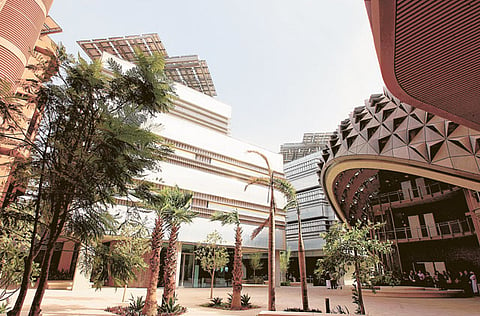Masdar City saves more power than it consumes
Excess energy of 6-7 MW sent to Abu Dhabi's national grid

Abu Dhabi: Supported by a 10-megawatt grid-connected power plant, Masdar City is "energy positive." The plant currently puts more energy into the grid than it consumes.
"The power this [10 MW] plant generates over a 24-hour period exceeds the amount that the [Masdar] Institute and the site offices with the construction site use," Afshin Afshari, manager of Energy Management at Masdar City, said.
The power plant, the largest in the region, is built over 22 hectares and has been in operation since April 2009. Masdar City uses 3-4 MW, while 6-7 MW are sent back to the national grid of Abu Dhabi.
However, as new buildings come online, the City will need additional renewable resources and Masdar is very well getting ready to produce more power.
The City recently installed a one-megawatt photovoltaic panel on the roof of the Masdar Institute of Science and Technology. The Masdar headquarters will also have three such panels generating three MW on its roof, Afshari told reporters during a media tour of the City on Sunday.
The 1,000 square-metre building will be a net zero energy building and is expected to come online in less than three years.
Outside the City, Masdar is working on large scale power plants such as Shams 1 and Noor 1.
Research
"Our power unit which is working on renewable projects is working on a PV plant, Noor 1," Afshari said.
Masdar had originally planned to use only CSP [concentrated solar power] for the 100 MW power plant, but since the price of photovoltaic (PV) panels is falling significantly, the project will be a combination of both.
"The cost of PV in recent years has come down significantly. It's much cheaper now than last year and it will be much cheaper next year," he said.
Masdar is also building a stand-alone 100 MW solar plant called Shams 1, the first of its kind in the Middle East, about 100 kilometres outside the city of Abu Dhabi. It's estimated to cost $600 million.
Masdar is also working on several pilot projects for district cooling. "Cooling is one of the major demands in our city," said Simon Braeuniger, who supervises pilot projects being tested for Masdar City.
A solar cooling project was launched last September and is the first of its kind in the GCC. Designed by Masdar, the project is expected to work as a 170 kilowatt chiller.
Another pilot project that is expected to come online late this year is geo-thermal cooling. For this, Masdar has dug two wells 2.5 kilometres deep.
At the Institute, the students' research has also been making some progress.
Zaid Tahboub, a graduate student, is working on the beam down project. The 100 kilowatt thermal power plant, still considered a test facility, is based on converting solar energy into thermal energy through a set of reflective mirrors.
Thermal energy
The mirrors reflect the sun's rays to a central focal point at ground level. Currently the students are designing the best receiver for the solar plant.
On campus, power usage is monitored through a 45-metre tower. Slim black panels on the corners of the tower work as litmus paper that changes colour depending on how much power is being used in the buildings.
"The building management system, against previously set parameters, will either go green or as we go towards crossing our usage parametres will start changing colour to blue, purple and eventually red," Martyn Potter, Director of Operations and Facilities at Masdar Institute, said.
The tower is also used as a cooler by directing hot air up and out of its surrounding area.
All electrical devices used in the buildings go through a sustainability checklist. With most electronic devices provided by the Institute, students have been strictly advised not to plug in their own electronic equipment because it could draw more energy that it should.
Currently, there are 167 students and 42 faculty members at the institute. With a new campus coming up next year, the institute should be able to accommodate 1,000 students and up to 100 faculty members.
The City currently uses nine Personal Rapid Tranport (PRT) carts, which run from the parking area to the Masdar Institute, and two electric buses.



